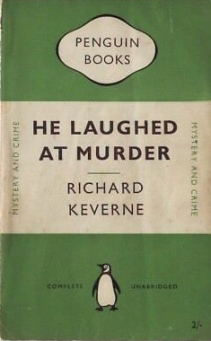
Richard Keverne was the pen name of Clifford James Wheeler Hosken. His ridiculously-titled He Laughed at Murder (1934) is a workmanlike thriller, with a young travel writer finding himself in increasingly deep water as he tries to help someone who once did him a good turn. Some years previously, as Michael Lorne was beginning his career, he was getting into trouble in a Latvian port, where paranoia about Russian spies was causing suspicious eyes to be turned in his direction. Charles Camber, a mysterious figure vague about his background, came to his rescue, for which Michael was grateful.
Later, his literary career taking off, Michael had lent Camber £200, allegedly to start a chicken farm near the Suffolk coast, though he doubted he would see much return on his investment. That had more or less been the extent of their acquaintance, until Michael receives a telegram at home in London asking him to meet Camber in an inn some miles from where he is supposed to be living. To his surprise, on arrival he finds not Camber but a young woman, Janet Howard, who says she is a neighbour of Camber’s and is worried about him. Surprisingly, Camber had spoken about Lorne to her, describing him as a friend.
She urges Michael to visit Camber to try to get him to leave the isolated old house he is living in, and when a concerned Michael visits Camber he finds him injured from a bullet wound. Naturally he decides he has to help his reluctant patient, who warns Michael that interfering could bring trouble on himself. Camber tells him a story about old-time smugglers, and treasure hidden in the house he is determined to find despite dedicated opposition. Michael discovers there are quite a few people who would like to see Camber out of the house: not just Janet, but her oleaginous step-father and the helpful (too-helpful?) local doctor, and he does not know who to trust. Matters are not helped by Camber’s frustrating lack of candour when it suits him.
Matters get murkier when a German actress, Stella Norda, makes enquiries about adapting one of his books, Baltic Byways, for the screen, a project necessitating him going to Hanover to discuss the business. It looks as though Camber is not the only one unwanted at the house. Michael asks his literary agent, Marian Keys, to help find out what is going on. Then a Scotland Yard detective, Inspector King, starts asking awkward questions about Norda, who is not all she appears, and Marian and Michael find themselves becoming mired in half-truths and evasions, Marian to protect Michael, Michael to maintain Camber’s confidentiality. It transpires that Camber’s search for something hidden in the house does not have its roots in smuggling after all, but in First World War spying and banknotes landed by a U-boat.
The story rattles along, painting a convincingly grim picture of rural Suffolk in winter. The characters are thin though, and while Michael is ostensibly the main protagonist, the enigmatic Charles Camber is the real draw as the reader tries to work out precisely what he is up to. One weakness of the plot is the idea that Camber, portrayed as taciturn in the extreme about his affairs, would have confided enough in Janet to give the impression Michael was a friend, prompting her to contact him (with the best of intentions). One rather sad aspect is that Marian finds Michael attractive, but is ten years older, so rules herself out as a potential partner. In 1934 she would have been of the generation with a high proportion of spinsters because of the war, condemned always to be Miss Keys.
Janet herself is rather colourless, unlike the energetic and resourceful Marian, so when the inevitable happens it is easy to think Michael chooses incorrectly (in fact he and Marian would have made a good series pair). It all ends with the villains getting their come-uppance, Janet permanently rid of her odious step-father, Michael making his intentions to her clear, and Camber – enjoying his new-found wealth out of Inspector King’s reach – coming handsomely good on his promise to show Michael a return on his £200 investment. Only Marian seems destined not to share in the general happiness.
